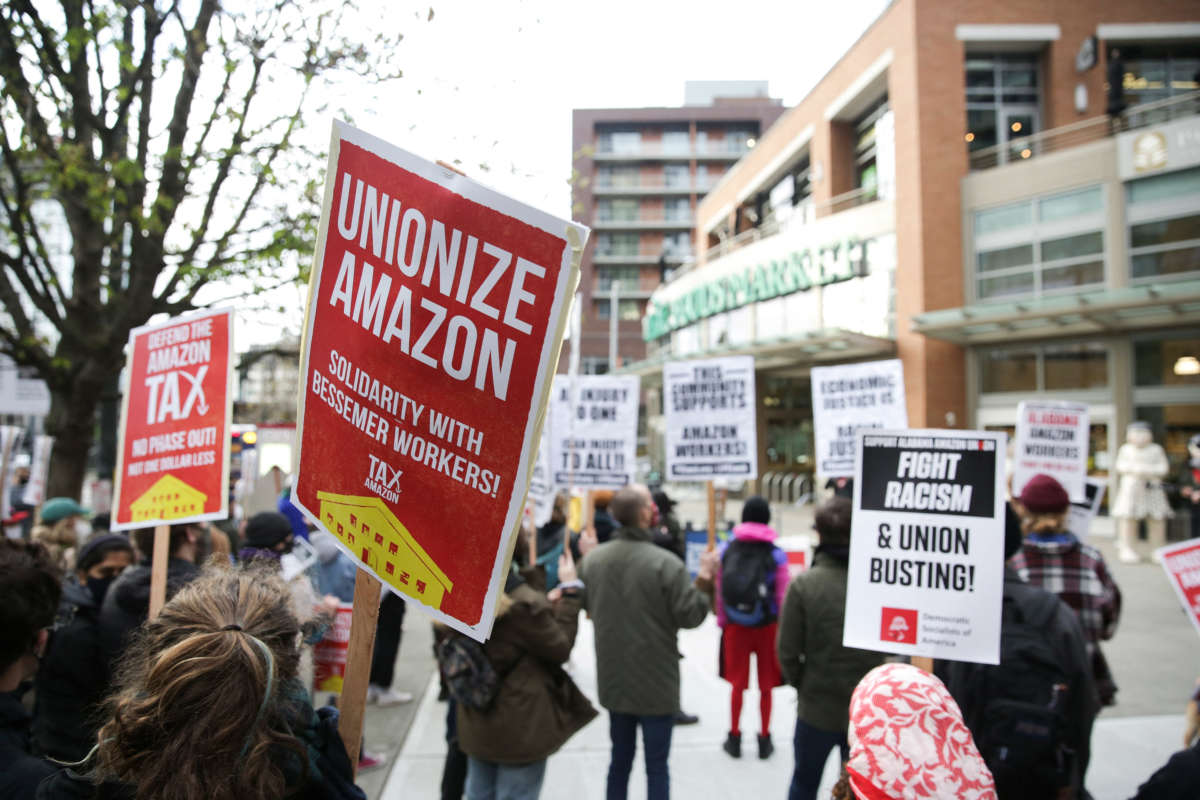Did you know that Truthout is a nonprofit and independently funded by readers like you? If you value what we do, please support our work with a donation.
The National Labor Relations Board (NLRB) has found that Amazon illegally fired two employees who spoke out about the company’s climate impact and labor practices during the pandemic.
Emily Cunningham and Maren Costa were fired in April of last year after criticizing Amazon for forcing its warehouse employees to work in unsafe conditions due to the coronavirus. The two employees circulated a petition internally about the risks of working amid COVID-19, and both also offered to match donations up to $500 on Twitter for the workers.
Cunningham and Costa were also two of the most visible members of the Amazon Employees for Climate Justice group, which has called on the company to better its climate practices.
The NLRB has now told Cunningham and Costa that, if the company doesn’t settle the case, the agency would accuse the company of unfair labor practices, reports The New York Times.
When the company fired the two employees, it said that it had fired them for “violating internal policies.”
“We support every employee’s right to criticize their employer’s working conditions, but that does not come with blanket immunity against any and all internal policies,” a spokesperson said at the time.
The NLRB’s decision is “a moral victory and really shows that we are on the right side of history and the right side of the law,” Cunningham told The New York Times.
The labor board also upheld a complaint filed recently against the company for interrogating and disciplining Queens, New York, Amazon warehouse worker Jonathan Bailey, who had led a walkout protesting the labor conditions during the pandemic. The NLRB has also filed a similar complaint against the company for retaliating against striking employees in Chicago.
The labor board has found the company to have violated labor laws so many times — at least 37 — that the agency is considering launching a formal, national investigation into Amazon, NBC reported last month.
The company’s poor pandemic labor practices also caught the attention of New York Attorney General Letitia James, who in February filed a lawsuit against the company for providing inadequate pandemic protections for its workers. “Amazon’s extreme profits and exponential growth rate [during the pandemic] came at the expense of the lives, health and safety of its frontline workers,” James wrote.
Amazon has recently come under fire for its public relations campaign attempting to deny allegations of poor labor practices. The company found itself in hot water last week after reports surfaced that Amazon CEO Jeff Bezos demanded a social media war against critics like Senators Bernie Sanders (I-Vermont) and Elizabeth Warren (D-Massachusetts).
Though it is well-documented that Amazon drivers face such time pressure from management that they often have to urinate in bottles while they’re on their routes, the company denied this last month on Twitter. The company then created several fake Twitter accounts supposedly run by Amazon workers to express anti-union positions and provide a rosier account of labor conditions.
The company’s desperate bid at bolstering its public image came as 5,800 Amazon workers in Bessemer, Alabama, wrapped up voting last week on whether to unionize. The NLRB is in the process of counting the votes and expects to release the results of the vote soon.
The unionization push has garnered the support of prominent figures like Sanders, who says that, if the workers vote to unionize, it will be a “shot heard around the world” and will inspire many other workers to do the same in their workplaces. The effort in Bessemer has reportedly already inspired over 1,000 workers at other Amazon warehouse locations across the country to contact the Retail, Wholesale and Department Store Union about organizing their workplaces.
Though the NLRB can discipline the company for violating labor standards, the agency has such little teeth that any punishment it can give is basically a slap on the wrist for a company as huge as Amazon. “Even when the NLRB sides with workers, the consequences, or so-called remedies, it’s able to mete out — typically small monetary settlements, back pay, or posting a flyer — are so minor that they do little to deter employers from violating the rules again,” wrote Caroline O’Donovan for BuzzFeed News.
Some Democratic lawmakers are trying to pass the Protecting the Right to Organize Act, or the PRO Act, to make it easier for workers to unionize and to give the NLRB the ability to issue harsher penalties for law-breaking employers. The legislation passed the House last month but faces two hurdles in the Senate: the filibuster and several uncommitted Democrats.
Trump is silencing political dissent. We appeal for your support.
Progressive nonprofits are the latest target caught in Trump’s crosshairs. With the aim of eliminating political opposition, Trump and his sycophants are working to curb government funding, constrain private foundations, and even cut tax-exempt status from organizations he dislikes.
We’re concerned, because Truthout is not immune to such bad-faith attacks.
We can only resist Trump’s attacks by cultivating a strong base of support. The right-wing mediasphere is funded comfortably by billionaire owners and venture capitalist philanthropists. At Truthout, we have you.
Truthout has launched a fundraiser to raise $45,000 in the next 8 days. Please take a meaningful action in the fight against authoritarianism: make a one-time or monthly donation to Truthout. If you have the means, please dig deep.
